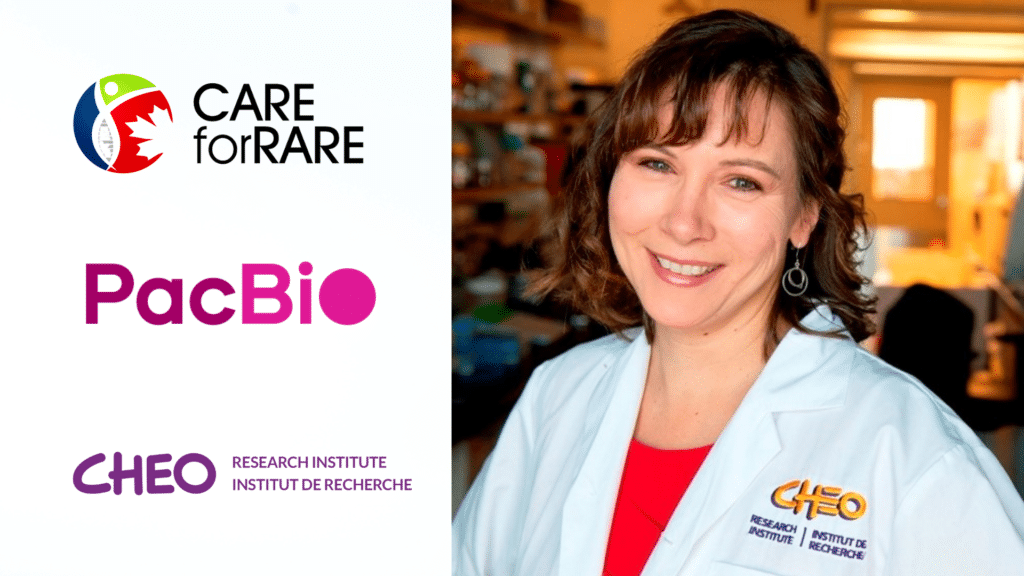
Over one million Canadians are impacted by rare genetic diseases, and over a third of these remain unsolved. For some families, this has led to decades-long diagnostic odysseys to find the cause of their genetic disorder. In addition to physical tolls of the disorders, not having an answer can be extremely frustrating and upsetting. Finally, thanks to a partnership between PacBio and the Care4Rare Canada Consortium (Care4Rare), led out of the CHEO Research Institute affiliated with the University of Ottawa, some of these families will be able to get the answers they seek.
Care4Rare is one of many institutions using PacBio’s HiFi sequencing in the research setting to identify rare disease mechanisms, in the hopes of integration in clinical settings. With accuracy >99.9% and long read lengths up to 25 kb, HiFi sequencing allows scientists the ability to find causative pathogenic variants and identify novel disease-associated genes by addressing challenges such as phasing of variants, achieving even sequence coverage, and the ability to sequence repetitive regions of the genome.
They have started to apply the comprehensive long-read technology to cases where the causes of genetic conditions impacting generations of families have remained unsolved, despite extensive exome, genome and RNA sequencing.
Recently, we had the pleasure of sitting down with Kym Boycott, MD, PhD, Senior Scientist, CHEO Research Institute and Chair of the Department of Genetics at CHEO to discuss the interim results what they are seeing using data from PacBio sequencers:
Dr. Boycott notes that the results so far have been extremely promising.
“HiFi sequencing has begun to show its early successes in identifying rare disease mechanisms that are intractable to the other available technologies at this time,” said Dr. Boycott. “It has nicely been used to find complex genomic rearrangements, insertions and deletions that are otherwise being missed.”
She envisions a future in which families can consult a clinical geneticist and have access to a variety of technologies that can provide the most efficient answers in the shortest time frame.
She also notes that HiFi sequencing shows great utility in shedding light on some of the most difficult-to-solve rare disease cases, as it can reveal genetic changes hidden to other technologies.
Care4Rare’s ultimate goal is to more than double the capacity to diagnose the rare diseases that impact approximately one million Canadians, and improve care for patients by tailoring management to their underlying condition.
“Our collaboration with Care4Rare is exciting for all of us who want to help find answers in rare disease,” said Jonas Korlach, PhD, Chief Scientific Officer at PacBio. “We believe that high-quality, long read WGS is the future of rare disease research, and we believe studies like this will make a meaningful impact on the medical community’s ability to make that future a reality sooner.”
To learn more about how PacBio HiFi sequencing is helping advance our understanding of rare disease:
- Register for our webinar with Children’s Mercy Kansas City
- Learn how whole genome sequencing helps us understand rare diseases in our Sequencing 101 series
- Visit the rare disease page
To learn more about the important work of Care4Rare visit care4rare.ca. Did you know:
There are about 7,000 rare genetic diseases (RDs) in Canada that impact more than one million Canadians and their families, and:
- 2/3 of these diseases cause significant disability;
- 3/4 affect children;
- more than 1/2 lead to early death;
- almost all have no targeted treatment
Further, more than 1/3 of these diseases remain unsolved (their genetic cause is unknown).
We are excited to be partnering with Care4Rare and look forward to what the future may bring! Stay tuned – we’ll be providing updates as the study progresses.